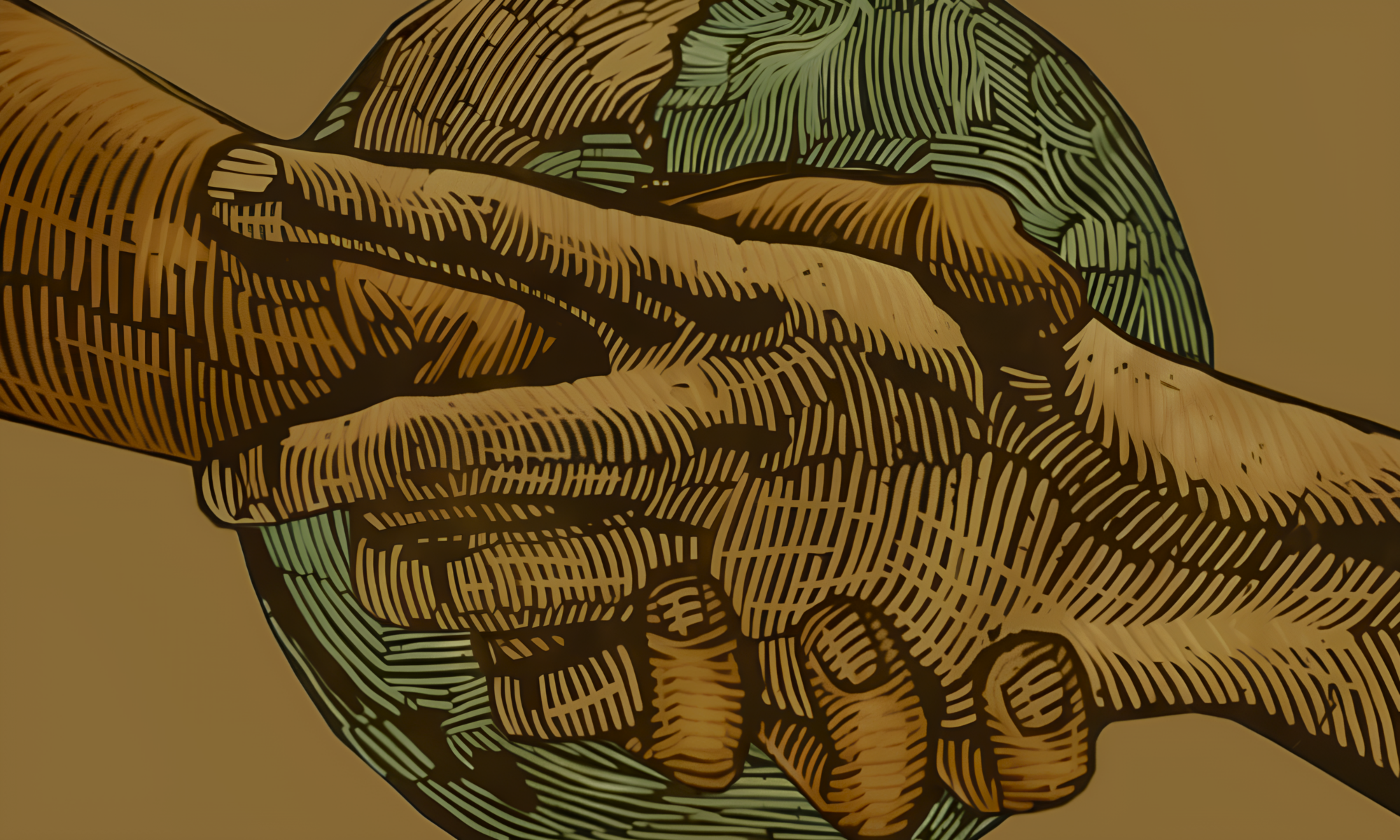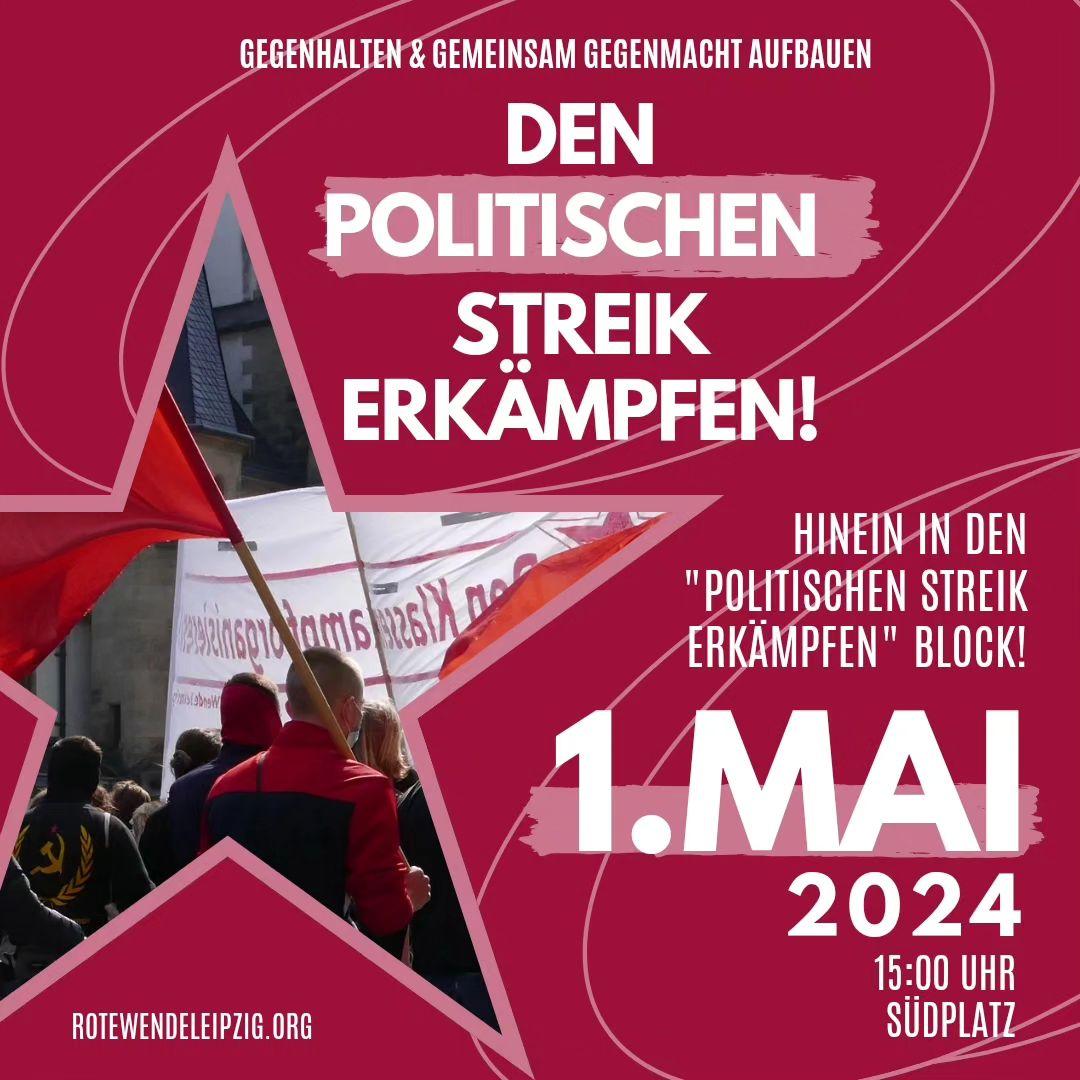-Fight for the Political Strike-
This year, we can observe what the escalation of current crises (such as inflation, war, and climate change) leads to, namely an intensification of class struggles in Germany. Particularly, the class struggle from above leads to the precarization of the living conditions of many people, driven by a progressive dismantling of the welfare state.
Alongside the racist neoliberal policies, visible through the introduction of payment cards for asylum seekers or the implementation of the Common European Asylum System (GEAS), there are reforms that are exclusively advantageous for the upper class and contribute to the division of our class, which will result in increasing impoverishment. The planned pension reform, which involves gambling pensions on the stock markets, or the ongoing price increases despite the fall in energy prices, are emblematic of anti-worker policies and a redistribution from the bottom to the top.
All these contradictions between the ruling class and the exploited proletariat strengthen the will of many wage earners to fight for an improvement in their living situation.
The many strikes over the last 3 years testify to the will of many people to stand against these conditions. At the center of these labor struggles have been day-to-day politically relevant confrontations, such as fighting for higher tariff wages, inflation adjustments, and better working conditions, as well as unitedly fighting against the dismantling of the so-called „welfare state“ to strike for a real improvement in the living situation of workers.
Connecting struggles and building counter-power!
It seems as if the workers‘ movement in Germany is regaining self-confidence. We realize this fact by leading labor struggles with content of greater significance. A regional example is the nationwide alliance „We Ride Together,“ which practices solidarity among public transport workers with other forces like climate activists, unions, or socialist groups. Also, the isolation of various sectors and their labor struggles is slowly breaking down. Thus, public transport and aviation workers come together to support each other in their struggles and learn from one another. Given the advancing impoverishment of the working class, particularly in terms of declining real wages and the increasingly palpable effects of capitalist logic, frustration and readiness to fight will continue to rise.
From Frustration to Class Consciousness
Current politics show us that we live in a highly divided society. When parliamentary representatives of the class enemy like Christian Lindner want to sow discord between the „hard-working population“ and the precarious parts of the wage-dependent population, when they call for „finally consistent deportations“ and try to stir up sentiment against migrants, this is nothing but an attempt to deepen the divide, which results in an increase in racist stereotypes and discrimination.
Whether it be train drivers, public transport employees, healthcare workers, or temporary workers in social and educational services, wage-dependent students, the unemployed, asylum seekers, or the aimless youth on our streets. A complete enumeration of all the oppressed would fill entire pages. But what unites us all is our membership in our class, the proletariat. A class in which each of us is forced to sell our labor as a commodity to guarantee survival, regardless of the price. The surplus value created by our labor is not social wealth but goes into the pockets of a few, namely the capitalist class. This power imbalance is given solely by the relationship of property. Those who own the means of production have control over what and how things are produced and possess the security of not having to sell their own labor to survive. Awareness of one’s belonging to the proletariat is crucial and fundamental to leading an effective struggle against the prevailing conditions. Only then can we withstand attempts at division.
May Day as a day of struggle for our class must be an unwavering expression of the connected struggles against the capitalist system. Here, the consciousness of one’s own class should not be considered nationally.
The proletarian knows no homeland! As a movement, we must understand ourselves as internationalist to utilize the weapon of solidarity. We stand alongside all oppressed and war-affected peoples of our world, not least those who are killed by the weapons and money of the imperialist beast, Germany.
From Palestine to Rojava, from the Philippines to India and all other liberation struggles and people subjected to imperialist oppression and war, our class consciousness remains international! The main enemy we can confront is in our own country. This is the bourgeois class state with its capitalists.
Reformism Offers No Solution
The „opportunities“ offered to us within the system to assert our interests are a farce. Electable parliamentary parties can only operate within the framework of the bourgeois class state and its property relations. This means concretely that the capitalist mode of production and its constraints are not intended to be overcome. The minimal improvements achievable within the capitalist system are only allowed to keep us quiet. The capitalists‘ goal is to maintain the classes and their position as the ruling class. Yet even minimal improvements are distant in times of inflation and crisis. The traffic light government with the participation of the SPD as a pseudo-worker’s party or the former self-described „anti“ war party, the Greens, is nothing more than a clique of workers‘ enemies screaming for rearmament, deportation, and the dismantling of the welfare state. Looking right, we see the AfD, a strengthening fascist party that exploits the fears of the petty bourgeoisie and parts of the proletariat, but in reality unites the interests of a particularly aggressive faction of capital.
And alongside the parliamentary elements, there is also the DGB, whose leadership is supposed to ensure a truce between capital and the proletariat. Nevertheless, the base of the leading unions should be supported in their struggles, not least to also push for a break with the reformist leadership.
From Class Consciousness to Organization
Despite all the depression in the face of our situation, there are means of struggle to unite common interests and exert pressure on the ruling class. Because a strike that takes place in isolated companies or sectors will always only bring about small, temporary changes. Even this is enough for bourgeois politicians and entrepreneurs to incite against it and publicly discuss strike bans as a countermeasure. The defamation and restriction of the right to strike will probably intensify further. To emerge victorious from our struggle, we need a strike capable of connecting various struggles and decisively hitting the logistics of capital: the political strike. The action known as a general strike is legally prohibited in Germany. This is a law that originally comes from the Nazi and early post-war period but is still useful for the rulers today. To name just a few historical examples: the general strike in the German Empire on November 9, 1918, forced the Emperor to abdicate and paved the way for the end of the first imperialist world war. Or in the Weimar Republic: if we look at the general strike of March 15, 1920, which prevented the fascist Kapp Putsch. However, to reap sustainable gains from a general strike today, a fighting organization of the working class is needed. A socialist party is needed that leads the struggles and unites the ranks of the proletariat. Class consciousness provides the foundation for paving the way for such a party. Waiting for a political strike until a mass party exists is wrong. The building of a powerful socialist organization must occur parallel to the struggles of our class. The task of socialist and communist forces must be to create class consciousness among our sisters and brothers and to win their trust and hearts through mass work in schools, companies, neighborhoods, and universities. It must be made clear that a means like the general strike is not achievable through currently legal paths. We must enforce it and not shy away from confrontation with the state and its cowardly organs of repression. Because we, the oppressed class, alone determine how we achieve our liberation from exploitation.
On May 1st to the streets! Let’s take to the streets together to fight for the political strike and advance the building of a socialist, revolutionary organization! The murderous excesses of capitalism, in the form of war and the destruction of our livelihoods, leave us no more time! Now is the time to take up the fight and sweep away the inhumane conditions. We don’t have much to lose, but we have a world to win!

